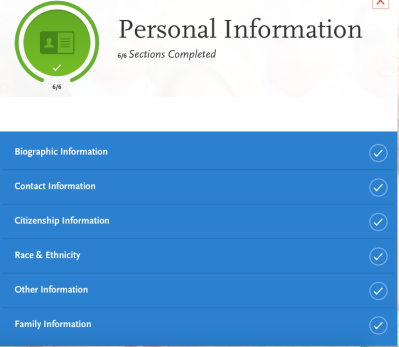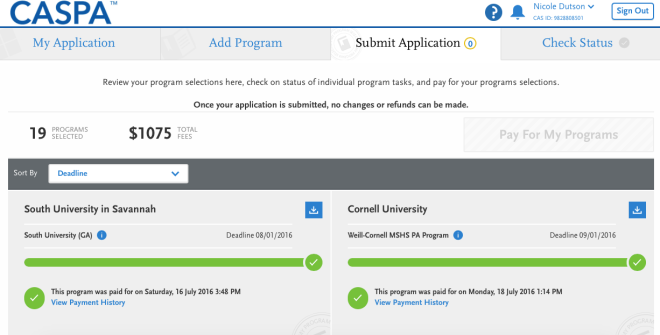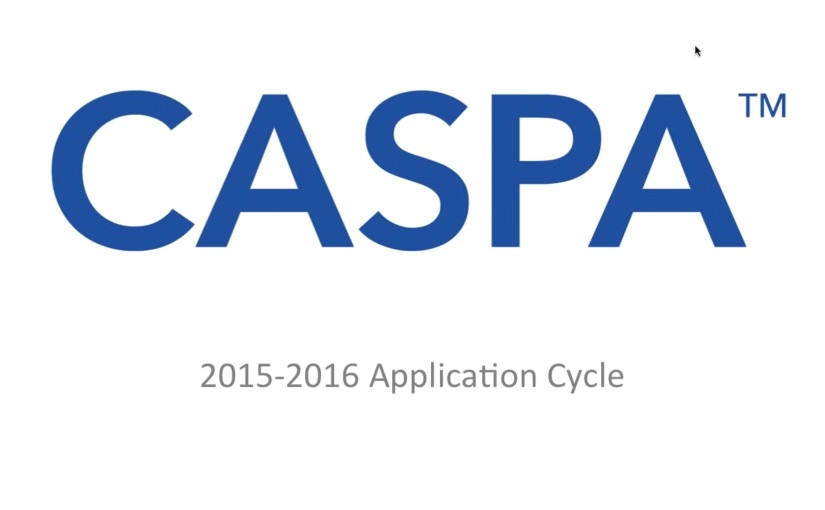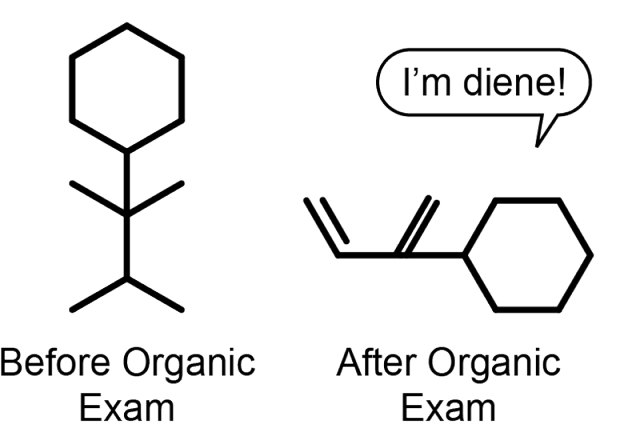For those of you applying to physician assistant school this cycle, you are probably familiar with what CASPA, (or the Centralized Application Service for Physician Assistants) is. This is the centralized site through which you send your primary application to all of the PA schools of your choice. CASPA opens on April 27, 2017 for the 2017-2018 PA school cycle, which means you only have a little over one month left to prepare your application materials to be entered into CASPA. This blog is to help you know how to coherently collect your information to put into CASPA, and also to help you familiarize yourself with the layout of the application service, as it is now closed and new members are not permitted to sign up until the release date at the end of April.
There are 4 main topics in CASPA: 1) personal information, 2) academic history, 3) supporting information, and 4) program materials. I will break each section down, step by step so you will know ahead of time all the information you will need to make your sure application is finished completely the first time!

As a side note, it is absolutely CRUCIAL to getting your CASPA submitted as soon as possible! Once your application is submitted, it goes through a verification process which can take up to several weeks. You want to be sure that your application is submitted early so it can be verified early, because your application will not be forwarded to your programs until it has been verified. Submitting your CASPA early is so important when applying to programs with rolling admissions, which many of them do. You can be the most competitive and competent applicant, but if you do not submit until August, the school of your dreams could already be full, so APPLY EARLY!
Okay, so the first section is the personal information, which is very straightforward. This section just requires your name, contact info, DOB, etc. It also asks a few questions regarding citizenship, ethnicity, and questions revolving the socioeconomic background in which you were raised. This section is all very self explanatory and there really is no significant prep work to this section.

The academic history section is one that you will spend a significant amount of time on, and it is also the section that can make your application be rejected in the verification stage. In this section you must enter all the schools you attended and the dates you attended these institutions. You will also have to manually enter EVERY SINGLE course code, title, subject, credit number, and grade received. Yes, you heard me. For every single course. It takes at the very minimum 120 credits to receive a bachelors degree so this part can be very tedious and annoying, especially considering you have to send them your official transcripts anyway. If any part of this is entered incorrectly and does not match perfectly to your official transcripts, this will delay the verification process of your application, so take your time! This is one of the major reasons why CASPA opens a weeks or so before you can submit. So it opens to begin entered data on April 27th, but it is usually not until the 6th or so of May that you can actually submit your application for verification.

There are companies that you can pay to enter in all of your coursework data for you, but c’mon if you can’t manage to enter approximately 40-50 classes into an application in order to become a PA, you probably aren’t that committed, so please do not pay someone to enter this information for you!
In the next month before CASPA opens, you should track down a copy of all of your unofficial transcripts to all of the schools you went to. I went to 2 different universities, plus took classes at a few different community colleges so I had multiple transcripts I needed to get. With everything online now, it makes it super convenient, however I definitely did not remember the login information to a school I went to 3 years ago! So do the prep work now; make sure you have all your pertinent login info and print out a copy of all your transcripts. Just to consolidate it all into one sheet, I made an excel spreadsheet with all the CASPA sections and filled it in so all I had to do when CASPA opened was transfer the data!
The final part of the academic history section is the standardized test area where you record the type, date, and score of the tests taken whether it was the GRE or the MCAT (most schools require the GRE, but some allow the MCAT as a substitute).
The next section will also take you some time, so buckle in! This is the supporting information section which means all the patient care hours, community service, awards, scholarships, you name it! Anything you want on your application to impress the judges will go into this section. Now I know you have already been compiling all of your relevant experiences and a log of the hours spent doing the various activities either in an excel spreadsheet or a word doc, right? Haha if you haven’t, don’t worry you still have time. But for you students that are still in your undergrad and have a few years till you apply, make sure you do this now! There is nothing worse than sitting down to do your application and not being able to recall events, hours, and contact information for the people for all of your different activities. So make it easy on yourself and record these things as you go!

So the first subsection is evaluations, aka letters of recommendation. START THIS NOW. I repeat, START THIS NOW. This can be another section that will hold up your application from being verified. You must have at least 2 of your letters submitted before your application can be placed in line to be verified. You need to give your evaluators plenty of notice and time to complete your letter. You need to reach out to those you would like to have write letters for you and ask them now. Once the application opens, you will be able to send them the link to submit the letter electronically, but at least if you ask them now, they can begin working on your letter and hopefully be finished and just need to upload it when the application opens. Also, as a PSA: remember to thoroughly thank your evaluators. A nice hand written thank you card goes a long way!
Next up is experiences; here you will list and categorize all of the things you have been doing for the past 4 years to stack your resume for PA school. You will list your volunteer opportunities, work experiences not related to health care, patient care experiences, research, and shadow opportunities. You will need the dates, names of individuals (and contact info if you have it), organization names, and a brief synopsis of the activity. I say brief because really this should be short. I have seen some people write use the entire character limit in this section. Think about the admission committees reading thousands of applications and 10-20 experiences per person. Keep it short and simple, the adcoms will thank you.
Next is achievements and certifications. Pretty self explanatory, any awards, scholarships, or certifications you have and have earned. This can be a great place for those with significant healthcare experience to shine! Putting down how you are BLS and CPR certified, or are a registered nurse, certified EMT, certified RT, or so many other things, can really show that you have already accomplished and learned valuable information in the healthcare field that is directly applicable to your future career as a PA.
Next is the part you have all been waiting for… the dreaded personal statement. You can not upload a word document, you must either copy and paste your personal statement into the box, or type directly into the box. I suggest you use a word document that way you can first, begin now! You do not want to wait until April 27th to begin writing this. Also, in word document form, you can easily email and forward along your personal statement to friends and family members to proofread your essay. THIS IS SO CRUCIAL. A good friend of mine did not let anyone read her personal statement when applying to graduate school. After interviewing, and being subsequently rejected, she reached out to the school for feedback on her application and they told her that there were multiple spelling and grammatical errors in her personal statement. She was mortified, as I think we would all be. I had numerous people, all from varying ages and levels of education read, and reread the different versions and edit of my personal statement to make sure I had the best version to submit. You are allotted 5000 characters, not words, but characters for your personal statement.
The next few subsections are again relatively easy: agreeing to a release statement that everything you put down is true, upload a copy of your resume (this is also a great time to clean up and update your resume!!!), and add professional memberships you belong to. I became a member of both the AAPA (American Academy of Physician Assistants), as well as my local chapter, ASAPA (Arizona State Association of Physician Assistants). Being a member of these professional organizations shows your level of commitment to the profession. It also has forums and discussions with current practicing PAs so you can stay abreast of the current events in the field. Another great thing about joining your local chapter is that there is a section for pre-PA students to network with current PAs in your area who are willing to allow you to shadow, as well as potential preceptor opportunities for rotations while in school.
The final section is program materials. In this section you will be shown all of the programs you have selected to apply for and the necessary additional work for each. Most programs just make you match your list of courses in your transcript entry to their list of prerequisite coursework. However, some schools use this section to have you answer additional essay questions even before the secondary application. The schools may also use this section to see if you are a reapplicant to their program.

All of these 4 application sections are under the opening homepage, which is the “my application” tab. You can switch to the “add programs” tab to look for schools based on the state they are in, and add them to your list of recipients. The next tab is the “submit applications” tab and this is where you pay for your application fees. Assuming the price will not increase from last cycle, the cost is $175.00 for the first school, and $50 for every school after that. This can easily, add up so be sure to choose the schools wisely. For some help on choosing schools, be sure to check out my blog post on choosing the right PA school.



Choosing the Right PA School
The final tab is “check status” which allows you to track the status of your application. You can check to see how the verification process is going, track your letters of recommendation, and make sure all of your transcripts and standardized test scores are received to ensure there are no outstanding prerequisites for your application.

If you have any further questions about navigating CASPA or any other PA questions in general, feel free to leave a comment below!

















